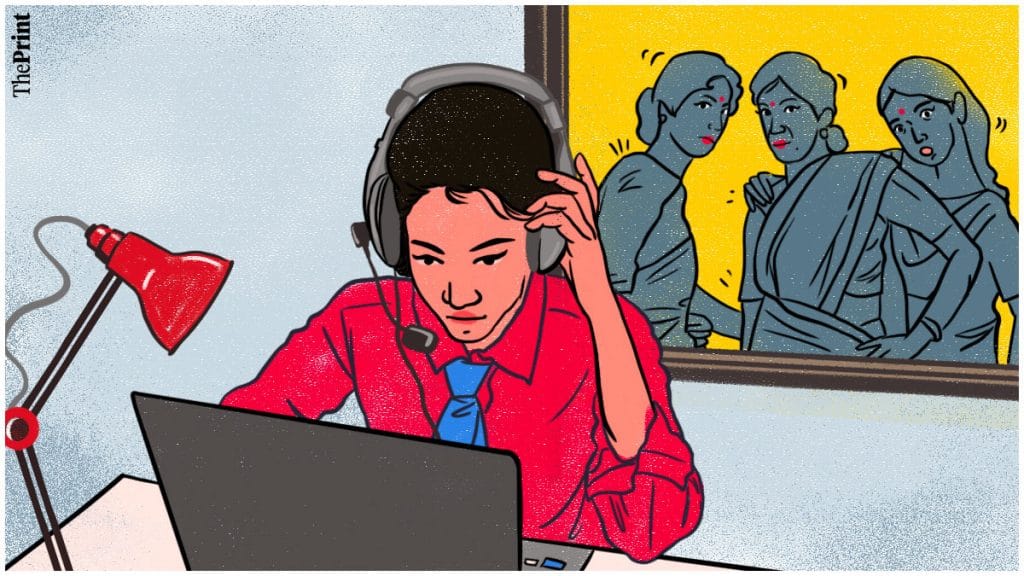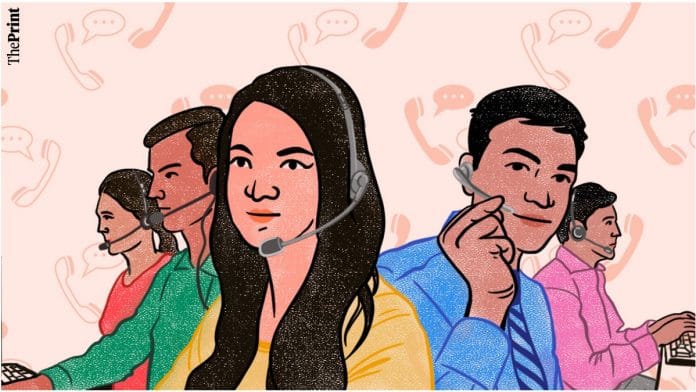Twenty-year-old Tina is tired of talking. It’s only natural—she makes over a hundred phone calls in a day. Dial, talk, hang up, rinse, repeat.
“I talk so much on the phone in the office that I don’t feel like talking at home,” Tina, the telecaller, says. At the end of a work day, all she feels is irritability and exhaustion.
Tina is among hundreds of thousands of young Indians who pass out of school and have to join the shrinking job market before they can even attempt a college education. ‘Calling’, as these jobs are informally referred to, is the easiest way to earn a livelihood for many first-generation educated Indians from modest families. Apps like Apna, WorkIndia, JobHai, Hirect offer them thousands of new telecaller jobs every day.
Her job is a far cry from the glory days of the IT boom in the 1990s when some of the biggest multinational and Fortune 500 companies started outsourcing their work to India. It saw the birth of ‘call centres’ and towering glass-facade buildings that changed the skyline of cities and promised well-paying jobs to lakhs of young educated English-speaking Indians.
Thirty years later, as chatbots and artificial intelligence (AI) drive customer interaction at MNCs, it is local companies and apps that are hiring you people en masse. They are either outsourcing tele-callers or setting up their own service centres. Instead of graduates and six-figure salaries, they are hiring students who have passed Class XII for salaries as low as Rs 7,000 a month. Most hail from migrant families.
In the two years since she became a tele-caller, Tina has asked strangers if they want to join the merchant navy, become models in the fashion industry, get credit cards or take herbal supplements to lead a greener, healthier life.
“Everywhere I tried, they asked for an experienced candidate. How on earth will XII pass-outs have any experience? Tele-caller jobs didn’t, so it looked like a good start,” says Tina.
Also read: ‘Overage’ at 21, rural India’s Army aspirants are running for their lives — and out of time
For women, the job comes with risks
Although the hours are long and the work repetitive, with most people hanging up on tele-callers if not outrightly abusing them, it offers a veneer of respectability in that these young women and men have an ‘office job’. But it’s an advantage that seems to work only for men.
Tina has told very few people that she is a tele-caller. Those who are aware taunt her for getting paid to ‘talk to boys’. “Her daughter is in the calling industry and entertains boys,” said an ‘aunt’ in Tina’s Delhi neighbourhood.
Unlike in the IT boom, when people aspired for a ‘call-centre’ job, Tina did not want to be a tele-caller. But the pandemic forced her to put her education plans on hold. The oldest of five siblings, she became a call-centre employee in 2020 after the first lockdown to help her father, who is a house painter and a daily wage worker.
Her friend, Uma, reluctantly introduced her to the ‘calling’ world. “She hid the fact that she called people to sell them products from everyone, but after I insisted, she revealed the truth,” said Tina.
She claims that a majority of call centres prefer hiring women. “A survey suggests that around 71 per cent of workers in the call centre industry are females. The main reason why many companies choose women is that they are more likely to be seen as approachable and understanding,” says Ramani Ganesh, senior vice-president, HR, Hirect India.
“The general belief is women tend to tolerate more,” says Tina, who not only faces taunts from the ‘aunts’ in her neighbourhood but also from the strangers she calls every.

In this industry, lines are crossed, said all the young women that The Print reached out to. “Getting yelled at is common, but sometimes men take liberties with innuendos or direct harassment,” Tina added. One man reportedly told her, “I’ll take the credit card if you agree to a ‘setting’ with me.”
It’s not just friends or family, clearly even male customers think women are hired for entertaining them.
Also read: Unemployment and unlimited data pack — UP’s youth are neither angry nor idle
Calling—a job with no dignity
Tele-caller jobs, though easily available, don’t guarantee dignity or stability. Most don’t want to talk about it and change their company every few months.
Uma, who is also 20, was almost ashamed of her job as a tele-caller. “You can’t brag about being that annoying person who irritates you every second day to sign up for a loan or a credit card,” says Uma, who is now a cashier at a burger outlet where she earns Rs 10,000.
Tina, on the other hand, is “stuck”. In her first job, she was tele-caller for a company that catered to some of the biggest banks in India. She had to convince strangers to sign up for a credit card. She was paid Rs 7,000 a month to make more than 200 phone calls every day.
“The pressure was too much. My salary depended on two successful leads every day. In the early days, I couldn’t convince anyone I called to get a credit card.”
She quit within three weeks. Her next ‘calling’ job was for a modelling agency in the children’s segment. It was her job to call up people, find out if they had children under the age of 15, and then ask if they wanted their child to be a model. It seemed a step up from flogging credit cards.
“Do you want a portfolio for your child? We will make it for Rs 10,000,” Tina would tell parents. But her calls didn’t translate into business and she quit again. This time she got a ‘calling job’ for a loan company.
It is a step-up because she no longer has to cold call strangers. Instead, she is part of a team that reaches out to people who have shown interest in taking a loan. She still has to make about 200 calls a day, but earns a salary of Rs 10,000.
‘Calling’ jobs are just a stepping stone for Tina. It’s a way to support her family while simultaneously studying for her Bachelors in Computer Applications at IGNOU.
Also read: Job insecurity will increase if Indian firms don’t tackle rising employee dissatisfaction
But a job is a job
For the most part, start-ups and app-based companies are the ones hiring students who’ve just passed out of school and completed class XII. “For an agent level entry position, you usually need Class XII and some IT and English language training. But you don’t make it to senior management positions usually by starting out as a call centre agent. There’s a flat career structure in the industry and no progression really. However, salaries do get progressively better for a while, it’s good compensation and flexible work,” says Sangeet Jain, PhD scholar at Cambridge University and a former researcher on employment at ORF.
For the men, there is an added rider – keep your calm and carry on. Because there is always the pressure to keep a job.
Rishikesh, whose family migrated from Rajasthan’s Sri GangaNagar to Delhi decades ago, joined ‘calling’ with an app for Rs 13,000 a month to show that he had an office job. “My community is still conservative and one has to ideally find a match [for marriage] by 18 or 19.” At 20, he’s under pressure to get married, and an office job gives him the respectability he needs to find a suitable woman.
His neighbours and family believe that he does important work in his office and comes home tired. “But all I do is sell herbal products. When visitors to the website leave their numbers, we call them up and ask, ‘Sir, you added this product to the cart but didn’t buy it. May I know why?’” he says.
About 30 per cent of the calls made had to be successful, but most people were not willing to buy products during the pandemic. “I quit after six months and joined another company that sells herbal medicines,” Rishikesh says.
While the salary is a pittance, the job offers him status.

“Calling is a job that tests your patience every day,” said Ranjit, 20, who works at the call centre of a company that sells contact lenses and spectacles. He recalls the experience of a colleague who had been humiliated by a customer. His ego couldn’t take it – “So he made a note of the customer’s number and called him from personal phone to give him a piece of his mind.”
The incident was flagged during the weekly call audits as the customer had filed a complaint with the company. The team leader reiterated what he told him on the first day–communication, politeness and patience.
Ranjit wanted to be a teacher, but was taken in by the idea of earning a salary. He took up the job along with enrolling for a BA at the School of Open Learning, Delhi University. “This is my second job and I am planning to quit this one too. I cannot cope with the pressure to turn calls into business.”
Also read: India urgently needs Right to Work. We are in a Great Depression in slow motion
The insta life
At home, the tele-callers feel alienated from their families, and in office, they are pitted against each other to convert calls into business. With only four days a month off, and hectic work schedules, they are unable to socialise or meet up with friends.
Many turn to social media, and Instagram is their playground. It’s where they make or consume reels.
Tina, dressed in a black top, posts a washroom selfie. The post is captioned, “Life is the biggest party you will ever be at.” Her photo highlights are titled, ‘Life is amazing’, ‘Royal entry’, and ‘I am unique.’ On Instagram, Tina is a confident woman, who uses filters and lip-syncs to “Tujh jaisey 36 firte hain, mere vargi aur na honi ve.”
Their future is a question mark. While jobs are always available, the attrition rate is high and there are only so many rungs on the ladder they can climb. A team leader is as far as they can go. The salary for that is Rs 20-30,000.
Tina and Uma know the answer. “Mostly women quit after they get married. No husband would want their wives talking to men for a living,” said Uma.
Ranjit and Rishikesh are looking for an opportunity that will allow them to get a proper job, but the odds are slim for a “Standard 12 pass”. If they stay in ‘calling’, they may rise the ranks to become team leaders and pressure an army of youngsters to pick up the phone and make more and more calls: “Hi, I am calling from….”






